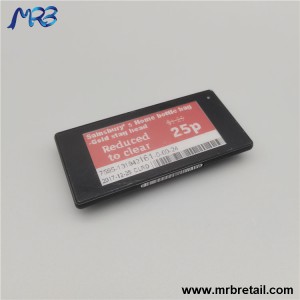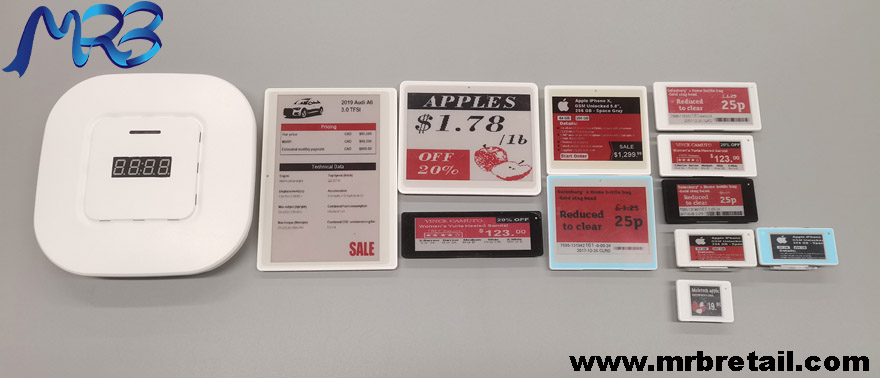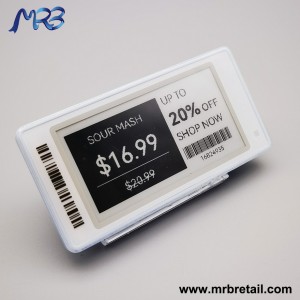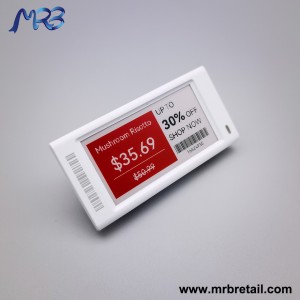2.66 inch Electronic Price Labelling
Product Show for 2.66 inch Electronic Price Labelling
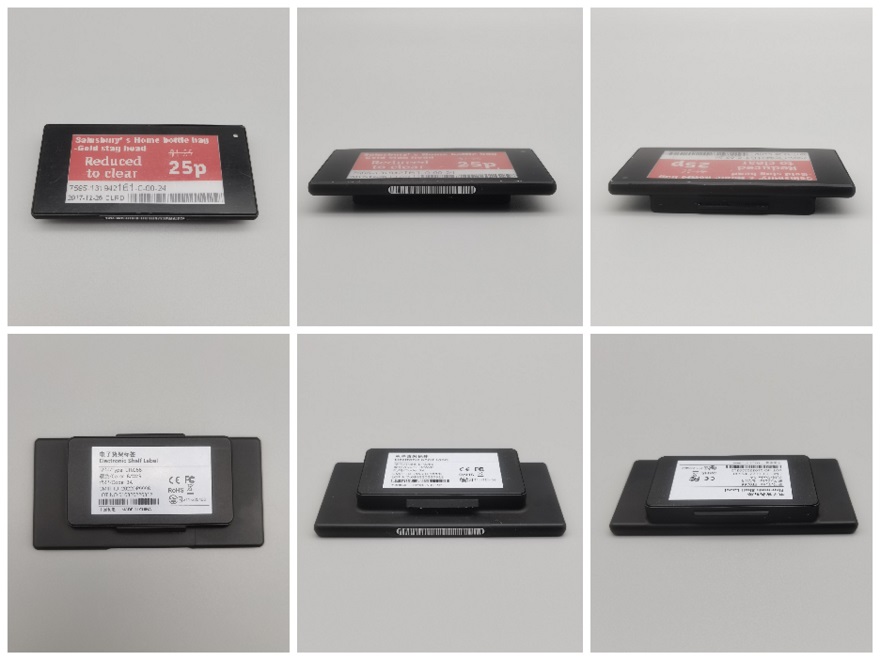
Specifications for 2.66 inch Electronic Price Labelling
|
Model |
HLET0266-3A |
|
|
Basic parameters |
Outline |
85.79mm(H) ×41.89mm(V)×12.3mm(D) |
|
Color |
White |
|
|
Weight |
38g |
|
|
Color Display |
Black/White/Red |
|
|
Display Size |
2.66 inch |
|
|
Display Resolution |
296(H)×152(V) |
|
|
DPI |
125 |
|
|
Active Area |
60.09mm(H)×30.70mm(V) |
|
|
View Angle |
>170° |
|
|
Battery |
CR2450*2 |
|
|
Battery Life |
Refresh 4 times a day, no less than 5 years |
|
|
Operating Temperature |
0~40℃ |
|
|
Storage Temperature |
0~40℃ |
|
|
Operating Humidity |
45%~70%RH |
|
|
Waterproof Grade |
IP65 / IP67【Optional】 |
|
|
Communication parameters |
Communication Frequency |
2.4G |
|
Communication Protocol |
Private |
|
|
Communication Mode |
AP |
|
|
Communication Distance |
Within 30m (open distance: 50m) |
|
|
Functional parameters |
Data Display |
Any language, text, image, symbol and other information display |
|
Temperature Detection |
Support temperature sampling function, which can be read by the system | |
|
Electric Quantity Detection |
Support the power sampling function, which can be read by the system | |
|
LED Lights |
Red, Green and Blue , 7 colors can be displayed |
|
|
Cache Page |
8 pages |
|
FAQ of Electronic Price Labelling
1.What is Electronic Shelf Labelling?
Replacing the traditional paper price tags in supermarkets, Electronic Shelf Labelling (ESL) is an electronic display device that updates product information through 2.4G wireless signal. Electronic Shelf Labelling gets rid of the cumbersome workflow of manually changing commodity information, and realizes the consistency and synchronization of commodity information on the shelf and POS cashier system information.
By using Electronic Price Labelling, the system can automatically change the price, realize automatic price management, reduce manpower and consumables, and optimize management process. Besides, flexible and fast marketing activities can be carried out online.
2.Why use Electronic Price Labelling?
Traditional paper price tags
VS
Electronic Price Labelling
1. Frequent product information changes consume a lot of labor and have a high error rate (it takes at least two minutes to manually replace a paper price tag).
2. The low efficiency of price change leads to inconsistent prices of commodity price tags and cash register systems, resulting in price "fraud".
3. The replacement error rate is 6%, and the label loss rate is 2%.
4. Rising labor costs are forcing the retail industry to find new sales growth points.
5. The labor costs of paper, ink, printing, etc. involved in the paper price tag.
1. Fast and timely price change: The price change of tens of thousands of electronic price labellings can be completed in a very short time, and the docking with the cash register system can be completed at the same time.
2. The lifespan of a single electronic price labelling can reach about 6 years.
3. The success rate of price change is 100%, which can increase the frequency of price change promotions.
4. Improve store image and customer satisfaction.
5. Reduce labor costs, management costs and other costs.
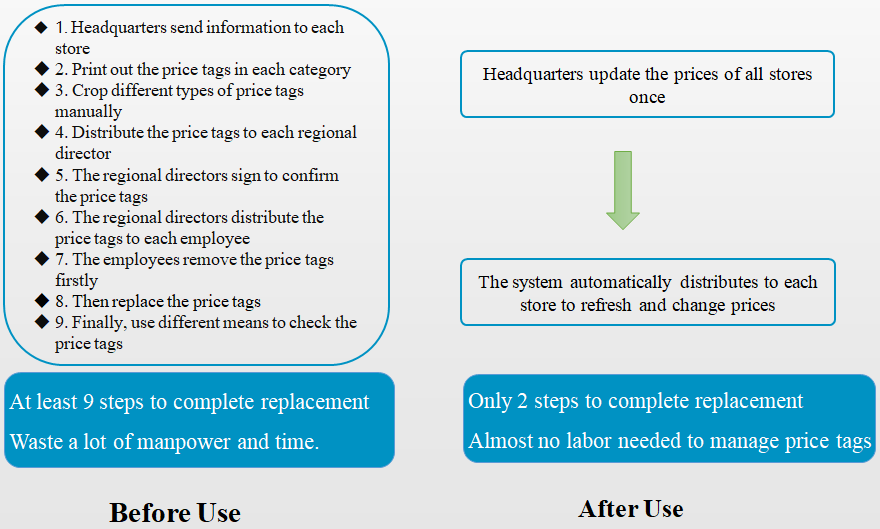
3.How does Electronic Price Labelling works?
● The headquarters server sends the new price to the base stations of every store wirelessly by network, and then the base stations sends data to each Electronic Shelf Labelling to update the product information and pricing.
● Base Station: Receive data from server first, then send data to the designated Electronic Shelf Labellings by 2.4G communication frequency.
● Electronic Shelf Labelling: Used to display product information, price, etc. on the shelf.
● Handhelf PDA: Used by supermarket internal staff to scan the product barcode and electronic price labelling ID, so as to bind the product and electronic price labelling quickly.
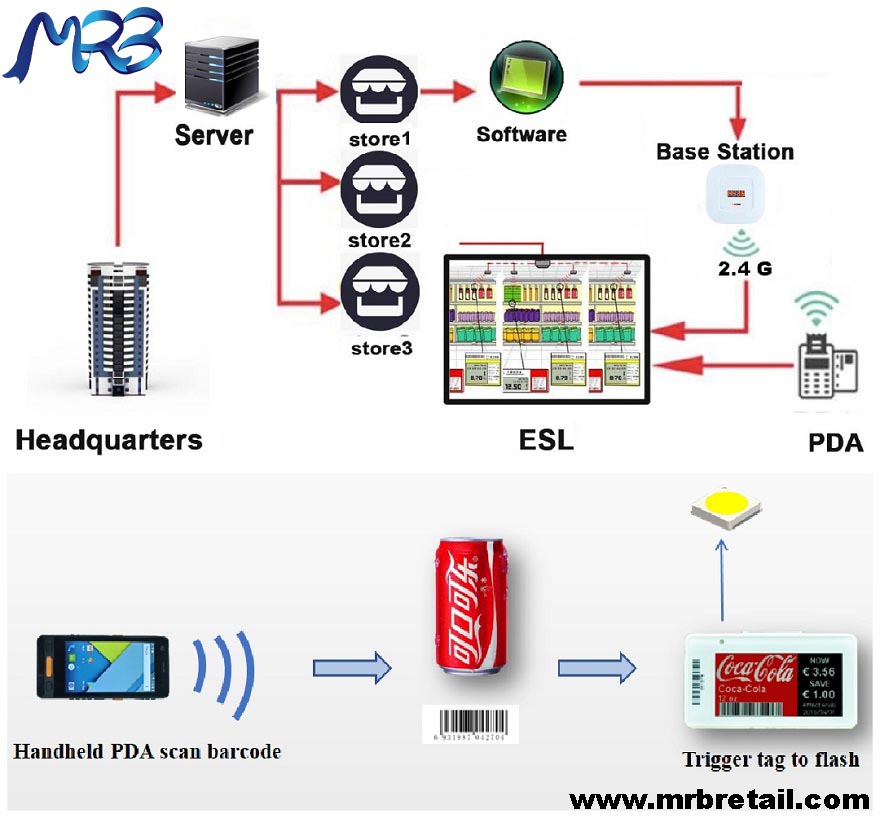
4.What are the application areas of electronic price labellings?
Electronic price labellings are used in new retail physical stores, fresh stores, supermarkets, hypermarkets, traditional supermarket chains, convenience stores, boutique stores, beauty stores, jewelry stores, home life stores, 3C electronics stores, conference rooms, hotels, warehouses, pharmacies, factories, etc. In general, the retail industry has the highest utilization rate of electronic price labellings.
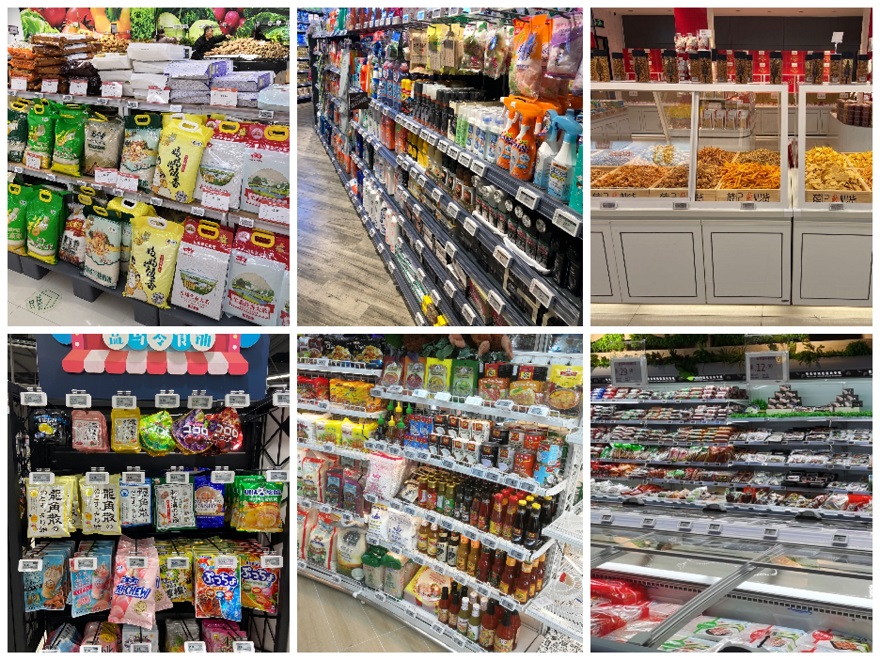
5.Do you have ESL demo kit for testing eletronic price labelling?
Yes, we have. ESL demo kit includes base station, all sizes electronic price labellings, demo software, free API and accessories.
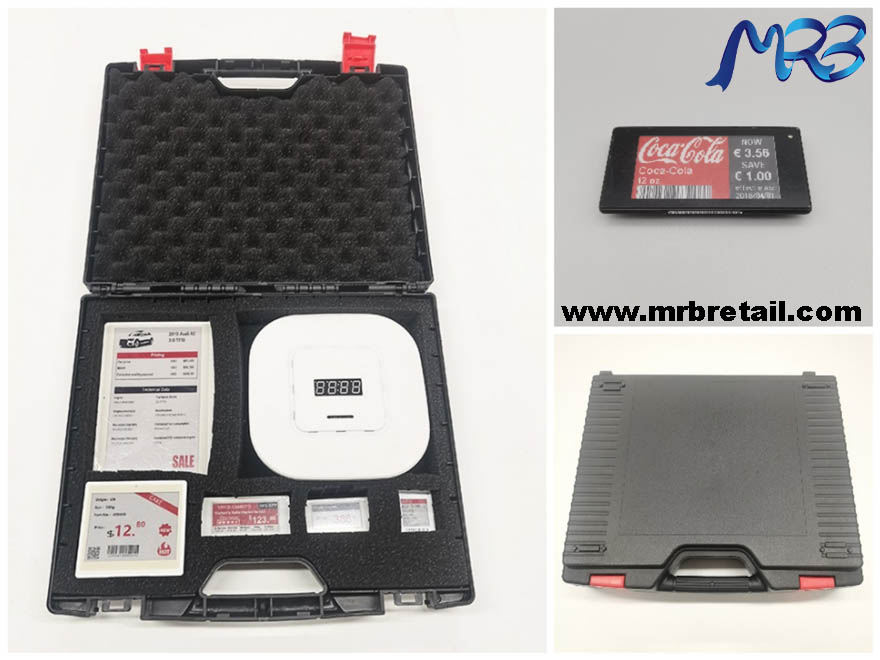
6.How to install eletronic price labelling in different installation sites?
There are 20+ accessories for eletronic price labelling, which can meet your requirements for different installation environments, such as fixing on the slideway of shelf, hanging on the T-shaped display hooks, clipping on the shelf, using disply stand to make it stand on the counter, etc. Welcome to contact us, we will recommend the suitable accessories for you.
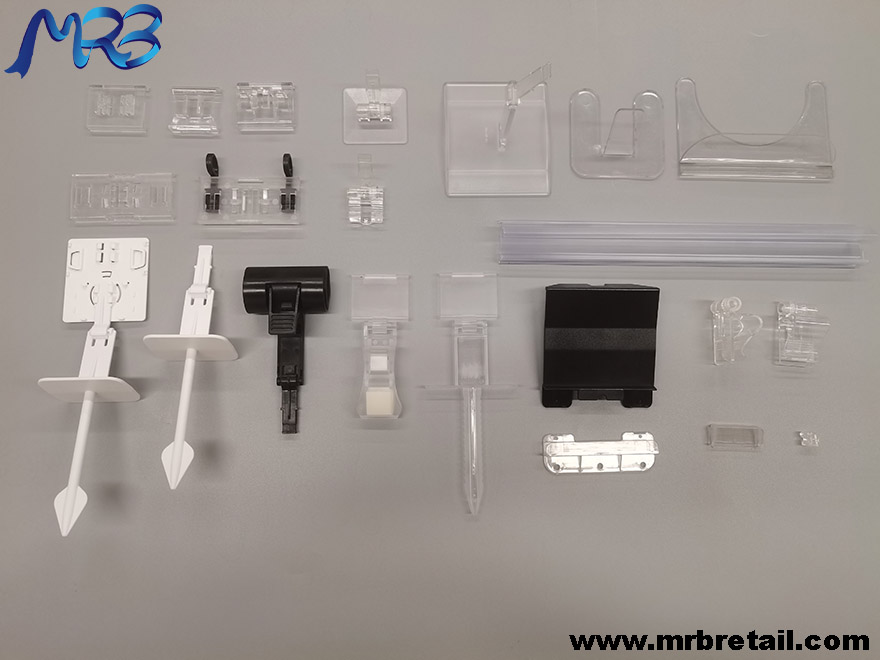
7.What kinds of battery is used for 2.66 inch electronic price labelling? How many batteries are required?
CR2450 lithium battery 3.6V is used. And 2pcs CR2450 batteries for 2.66 inch electronic price labelling is enough.
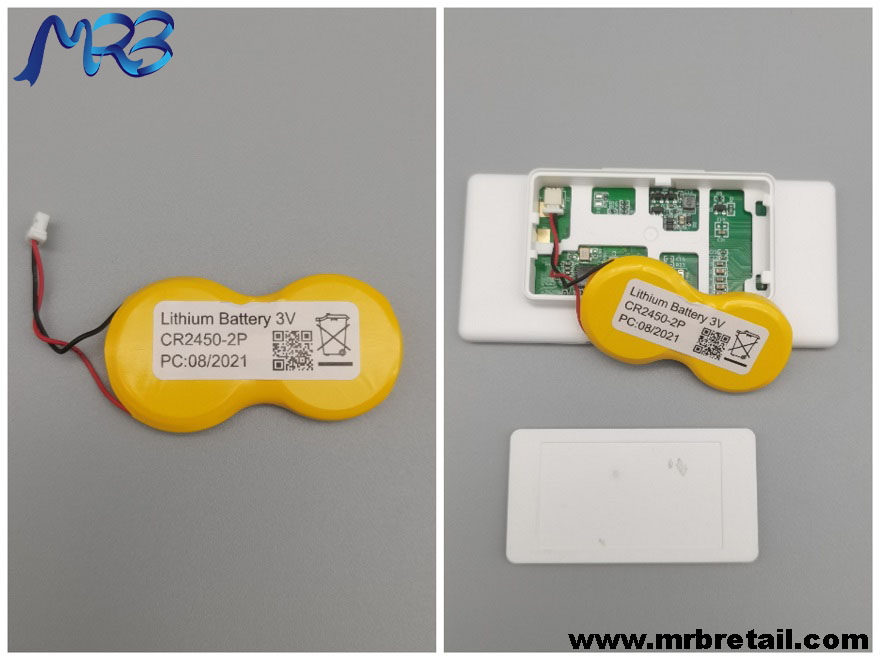
8.We have POS system, do you provide free API? So we can make integration with our POS system?
Yes, free API is available for integration with your POS/ ERP/ WMS systems. Most of our customers have made integration with their own systems successfully.
9.What communication frequency is used for your electronic shelf labelling? What is the communication distance?
2.4G wireless communication frequency, up to 25m communication distance.
10.Besides 2.66 inch electronic shelf labelling, do you have other E-ink screen display sizes for choice?
Besides 2.66 inch, we also have 1.54, 2.13, 2.9, 3.5, 4.2, 4.3, 5.8, 7.5 inch electronic shelf labellings. Other sizes can also be customized, such as 12.5 inch, etc.
For more sizes of electronic shelf labellings, please click the below photo or visit here: https://www.mrbretail.com/esl-electronic-shelf-labels-product/


